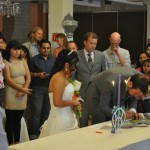According to the Rabbinical Assembly, no Conservative Rabbi may officiate at interfaith weddings between Jews and people from other religions. The ban has been a subject of controversy, especially with the increasing number of interfaith marriages in recent times.
Rabbi Seymour Rosenbloom, president of the Jewish Social Policy Action Network, called on the leadership of the Conservative Movement to drop the ban in a recent article in The Times of Israel. Rabbi Rosenbloom served for 36 years as spiritual leader of Congregation Adath Jeshurun in Elkins Park, Pennsylvania before retiring. Although he was a supporter of the prohibition in his 42 years as an active rabbi, he has since changed his tune and now opposes the notion.
“For a decade or so before my retirement from the pulpit in 2014, I increasingly felt uncomfortable sending young people for whom I had been their lifelong rabbi and our congregation their lifelong place of worship to a rabbi they did not know to perform the most sacred ceremony of their life just because their beloved was not Jewish. I felt I was abandoning them,” said Rabbi Rosenbloom.
The turning point for Rosenbloom came when his stepdaughter got engaged to a non-Jewish man. Although he initially thought about referring them to one of his Reform colleagues, he changed his mind when he saw how committed the couple was to having a Jewish wedding, and their desire to have somebody they personally know officiate the ceremony.
The Conservative Jewish community has opposed officiating interfaith marriage for fear that future children will not be raised as Jews, and hoping it will discourage thoughts of marriage outside Judaism. The fear is unfounded as the 2013 Pew Research Center study of U.S. Jewry shows that sixty-one percent of millennials born to intermarried couples consider themselves Jewish. There is also no guarantee that children born to Jewish parents will grow up to be dedicated Jews themselves.
“The Conservative movement has approached intermarriage with ambivalence. Rabbis must refuse to be part of intermarriage ceremonies (we’re not even supposed to attend such ceremonies, though many of us do), but after the wedding we open our arms to the newly married couple and invite them to become part of our community,” says Rabbi Rosenbloom of the practice. “But those we push away on Saturday night are not so ready to come back on Sunday morning. It is not easy to get over the initial sting of rejection and the stigma of the ambivalent way we view their marriage.”


